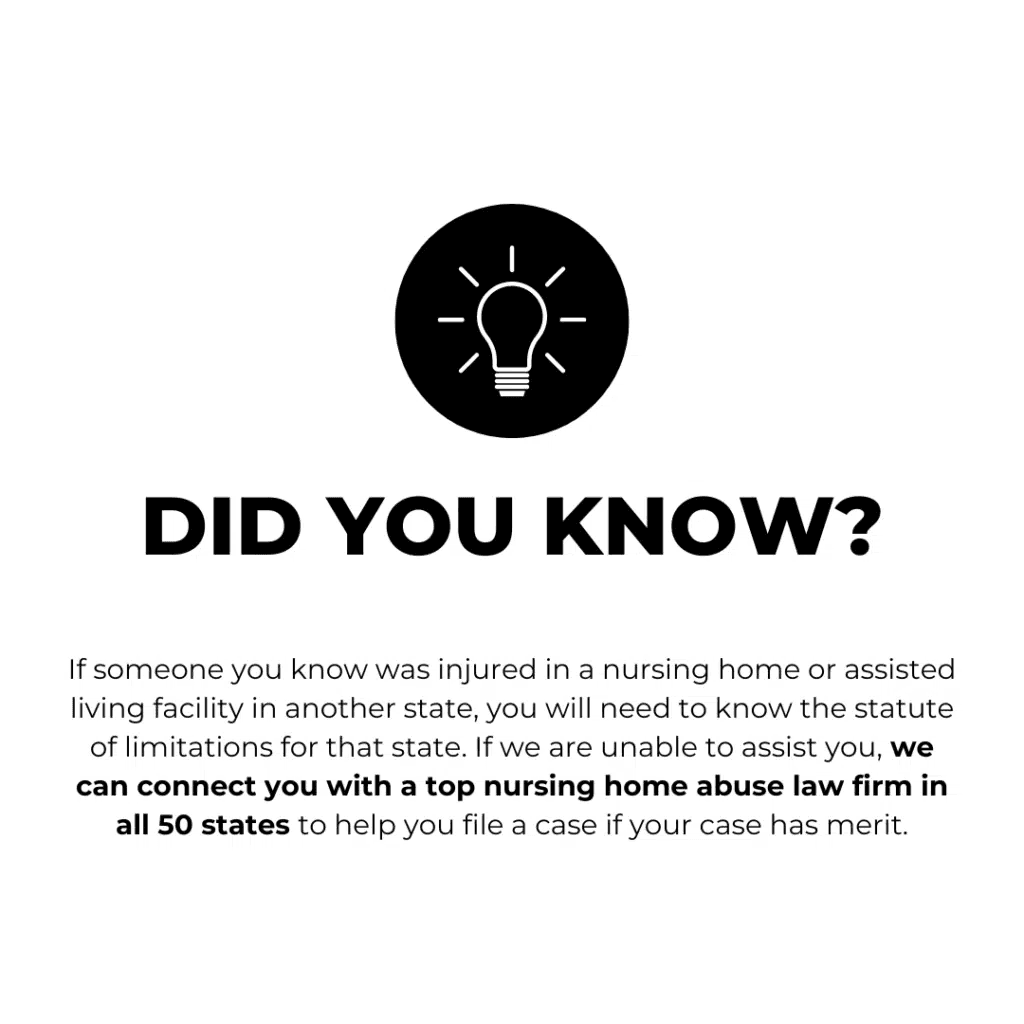
Nursing home abuse and neglect put vulnerable residents at serious risk, leading to malnutrition, dehydration, infections, and preventable injuries. When facilities fail to provide adequate care, residents suffer, and families are left feeling helpless. Lack of supervision, improper medical treatment, and unsafe conditions can result in devastating harm. Understanding the warning signs, knowing your legal rights, and holding negligent facilities accountable are crucial steps in protecting your loved ones. Learn how to take action and seek justice.
November 5, 2024
3 min
Too often, we hear shocking, tragic, or even repulsive stories of nursing home resident abuse or nursing home resident neglect in the news. We might ask ourselves, “How can caregivers abuse and neglect their elderly residents?” Caregivers can become jaded or lack compassion for their residents, causing caregiver apathy. This widespread phenomenon is, unfortunately, tied to a more systemic issue — the profit motives that drive management in many nursing homes. As financial considerations take precedence over patient care, caregiver burnout, and indifference can lead to neglect, endangering the very lives that nursing homes are meant to protect.
The interplay between corporate profit motives and caregiver apathy in nursing homes has a significant and far-reaching impact on the quality of care that residents receive. This article aims to explore how profit-driven management fosters a culture of neglect and apathy among caregivers, leading to deteriorating conditions in nursing homes. We’ll also examine the broader implications of this issue and offer potential solutions to this growing problem.
Caregiver apathy in nursing homes refers to a state in which staff members become emotionally disengaged from their work. In such cases, caregivers may feel indifferent toward the needs of residents, and their lack of concern can manifest in various ways. This may include failing to respond promptly to call lights, neglecting personal hygiene care, overlooking medical needs, and providing subpar emotional support to residents.
Caregiver apathy often results from burnout, a natural consequence of working in a stressful, understaffed, and poorly supported environment. In many nursing homes, caregivers are expected to manage overwhelming workloads with minimal resources and little recognition. Over time, this can lead to emotional exhaustion, cynicism, and a diminished capacity to care.
However, while burnout contributes, caregiver apathy is often exacerbated by the corporate structures that govern nursing home operations. In these settings, profit is frequently prioritized over patient care, leading to decisions that undermine the well-being of both staff and residents.
In for-profit nursing homes, financial considerations often dictate staffing levels, care protocols, and resource allocation. While profit-making is a standard goal for any business, this focus becomes problematic at the expense of quality care for vulnerable residents. The pressure to cut costs and maximize profits frequently leads to inadequate staffing levels, increasing the workload for caregivers and contributing to their apathy.
One of the most apparent ways profit motives impact caregiver apathy is through understaffing. To reduce labor costs, management may limit the number of staff on each shift, forcing the remaining caregivers to handle a disproportionate number of residents. Understaffed nursing homes are significantly more likely to experience higher rates of neglect and poor care outcomes.
Inadequate staffing increases caregivers’ physical workload and limits the time they can spend with each resident. This rushed approach to care can leave caregivers feeling disconnected from their patients, fostering feelings of helplessness and frustration. Over time, this lack of personal connection can lead to emotional disengagement, as caregivers begin to see their work as a series of tasks rather than an opportunity to provide meaningful support.
Another consequence of profit-driven management is low wages for caregivers. Nursing home employees, remarkably certified nursing assistants (CNAs), are often paid near minimum wage despite the demanding nature of their work. Low wages and physical and emotionally taxing job responsibilities contribute to high turnover rates among nursing home staff. Forming caring and trusting relationships between residents and staff is impossible when a caregiver is unlikely to stay around.
High turnover further exacerbates caregiver apathy, as new staff members are often thrown into difficult situations with minimal training and support. This lack of continuity in care can be distressing for both caregivers and residents, eroding the trust that is essential for providing quality care. As caregivers come and go, those who remain may feel increasingly disconnected from their work, leading to further emotional disengagement and apathy.
In many for-profit nursing homes, corporate policies are designed with efficiency and cost-cutting in mind, often at the expense of resident well-being. For example, some nursing homes may implement strict time limits on how long caregivers can spend with each resident or require staff to prioritize documentation over direct care. These policies can create a sense of frustration among caregivers, as they are forced to prioritize administrative tasks over providing meaningful care.
Also, profit-driven management may skimp on essential supplies, such as medical equipment, personal hygiene products, and food. Caregivers are often left to make do with inadequate resources, which can further contribute to feelings of apathy. When caregivers cannot meet residents’ basic needs due to lack of supplies, they may become demoralized and emotionally disengaged, feeling powerless to provide the care they know their residents deserve.
Caregiver apathy has severe consequences for nursing home residents, who are often unable to advocate for themselves. When caregivers become emotionally disengaged, they may overlook essential signs of distress or fail to provide adequate care. This neglect can take many forms, including:
Neglect not only diminishes the quality of life for nursing home residents but also increases the risk of serious medical complications, hospitalizations, and even death. The Centers for Medicare & Medicaid Services (CMS) regularly cites neglect as a leading cause of preventable harm in nursing homes, highlighting the urgent need for reform in the industry.

While caregiver apathy and nursing home neglect are complex issues, there are steps that can be taken to address the root causes of the problem. These solutions involve regulatory changes and corporate culture shifts to prioritize patient care over profit.
One of the most effective ways to reduce caregiver apathy is to increase staffing levels in nursing homes. When caregivers are not overwhelmed by unmanageable workloads, they are more likely to develop meaningful relationships with residents and provide better care. Federal and state regulations should establish minimum staffing ratios that ensure residents receive the attention and care they need.
Another crucial step in reducing caregiver apathy is to improve wages and working conditions for nursing home staff. Fair compensation, coupled with benefits such as paid sick leave and mental health support, can help retain experienced caregivers and reduce turnover. Additionally, providing opportunities for career advancement and continuing education can help caregivers feel valued and engaged in their work.
Shifting the focus from corporate-driven efficiency to person-centered care is essential for reducing caregiver apathy. Person-centered care emphasizes treating residents as individuals with unique needs and preferences rather than as tasks to be completed. Nursing homes can create a more compassionate and fulfilling work environment by allowing caregivers the time and flexibility to build relationships with residents.
Regulatory agencies hold nursing homes accountable for neglect and poor care practices. This includes conducting regular inspections, imposing fines for noncompliance, and publicly reporting violations. However, the quality of the investigation often depends on the motivation of the state investigator handling the case. Additionally, there is a substantial caseload for state investigators, diminishing their ability to investigate each claim thoroughly. This may result in facilities not being penalized at all for harms to residents. Even when penalties are enforced, they are typically low amounts that do not outweigh the profits nursing homes realize from understaffing their facilities.
However, more nursing homes are increasingly being held accountable in the civil justice system. Juries are awarding large verdicts against nursing homes for neglect and abuse, especially when understaffing is a component of the case. Jury verdicts grab the attention of nursing home owners by speaking the only language they respect – money. Making nursing home neglect and abuse unprofitable and making nursing home owners run the risk of bankruptcy for their neglectful practices helps to call attention to the problems of understaffing and resulting caregiver apathy.
Caregiver apathy in nursing homes is a serious issue that is inextricably linked to management’s profit-driven motives. When financial considerations take precedence over resident care, the well-being of both caregivers and residents is compromised. Understaffing, low wages, and corporate policies prioritizing efficiency over quality care all contribute to a culture of apathy and neglect.
Addressing this issue requires a multi-faceted approach that includes regulatory reforms, improved working conditions, and a shift toward person-centered care. Holding nursing homes accountable for neglect through the civil justice system is a crucial tool to disincentivize abusing staff members and residents through understaffing and help create a more compassionate and effective system of care for our elderly population.
Michael Hill is a nationally recognized attorney who handles exclusively cases against long term care facilities. Michael and his firm, Michael Hill Trial Law, are headquartered in Cleveland, Ohio but handle cases across the country.
Disclaimer: This information is provided for informational purposes only. Nothing in this article should be construed as providing legal advice or the creation of an attorney client relationship. Laws are updated frequently and change from state to state. If you desire legal advice, you can contact Michael Hill Trial Law at www.protectseniors.com, send an email to info@protectseniors.com, call (800) 659-2712 to begin an investigation, or contact another attorney.